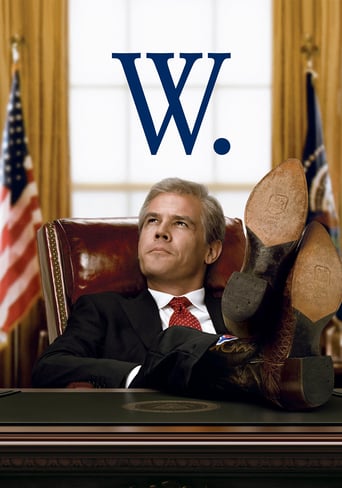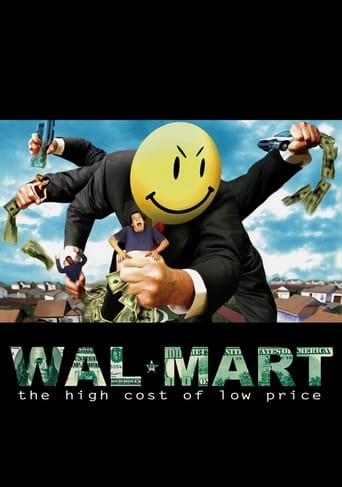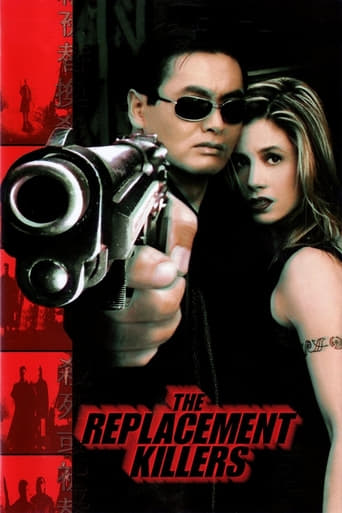Wal-Mart: The High Cost of Low Price (2005)
This documentary takes the viewer on a deeply personal journey into the everyday lives of families struggling to fight Goliath. From a family business owner in the Midwest to a preacher in California, from workers in Florida to a poet in Mexico, dozens of film crews on three continents bring the intensely personal stories of an assault on families and American values.
Watch Trailer
Cast
Similar titles






Reviews
Very well executed
I don't have all the words right now but this film is a work of art.
One of the worst ways to make a cult movie is to set out to make a cult movie.
Through painfully honest and emotional moments, the movie becomes irresistibly relatable
**May contain spoilers!!Wal-mart: The High Cost of Low Price is a documentary produced in November of 2005 by Robert Greenwald and Brave New Films. Greenwald and Brave New Films take an extraordinarily biased approach that will make you feel, think, and probably shop differently. If you don't already know or understand what's wrong with Wal-mart, this documentary will without a doubt fill in the blanks. This documentary exposed Wal-Mart's unprincipled business practices through interviews with former employees and executives and small business owners of communities Wal-mart inhabited. The film leaps into the incredibly personal stories and everyday lives of families and communities struggling to fight an invasive giant. A working, single mother is forced to rely on government assistance to provide health care for her two children. A Missouri family loses its business after Wal-Mart receives over $2 million to open its doors down the road. A Chinese woman worker is forced to work in intense heat in Wal-mart factories for minimal pay. A mayor struggles to provide for his first responders after Wal-Mart leaves and relocates just outside the city limits. Hundreds of lawsuits take place each year against the retail giant. There is not one main narrator in this film, but rather countless people we interact with every day in our local hardware stores or family-owned grocery stores, which makes this documentary hit a little closer to home. Many people don't realize what is happening with Wal-mart and the negative impacts it's making, but the numerous narrators bring it to light. It's difficult to not be biased while watching this documentary. Real accounts by real people describe their difficulties and struggles because of Wal-mart's actions. For example, the documentary begins in a small town called Middlefield, Ohio. Long established, independently owned stores were nearly destroyed. The Hunter family, who opened H&H Hardware and has run it for many generations, was driven out of business because local people saw Wal-mart as a cheaper and more easily accessible outlet for goods. Wal-mart is a monopoly and no control has been legislated to protect free enterprise in these towns they takeover. Its strategy, supposedly, is to "crush the competition". Millions of dollars in tax abatements are given to Wal-mart to establish itself in a new location, but local owners seeking equal abatements are turned down. Cities are often between a rock and a hard place because if they don't provide Wal-mart with what they want, the company will simply pick up and leave said location leaving the town deserted. When Wal-mart leaves, it takes away key jobs that may not have existed before in the town.As many as 31 states have filed lawsuits against the Goliath for unfair employee practices, unpaid wages, and discriminatory accusations. Wal-mart is aggressively anti-union. At a minimal threat from unions, as described in the film, three managers were flown by jet immediately to the "problem store" and identified and fired specific employees pertaining to the nuisance. They would halt employee wages and blame its actions on the unions in the area. Wal- mart's employees, nearly 70% women, have been bombarded by discriminatory remarks from their managerial staff. A $1.6 million lawsuit has been filed against Wal-mart for its discrimination against women (Wal-mart). Different opinions and thoughts can be devised simply by the way a documentary is portrayed. Throughout this documentary, first hand accounts of experiences of employees, managers, and community members helped shape the biased directive for this film. Having these people narrate this documentary allowed audience to be more drawn in to the subject and be more in-tune to the real story of the film. In my own experience, it allowed me to closely relate a lot more to the people narrating this documentary. The film mostly entailed a narration by these people and also depictions of strikes and commercials that supported the problems these people faced with the Wal-mart Corporation. Being able to see these protests by the employees and "fake" commercials by this behemoth company gave even more of a reason to dislike it. If there was only one narrator in this film, I feel it would have been a lot more difficult to understand the reasoning behind it. By supplementing it with countless interviews and first-hand accounts, it gave the audience a bigger case against Wal-mart and more evidence of its wrongdoings. All in all, as easily seen by this documentary, Wal-mart is not what everyone may think about it. Wal-mart portrays itself in commercials as a stellar employer in employee treatment, community involvement, environmental protection, charitable offerings, and human rights. This is obviously not the case. As presented by these many narrators, Wal-mart is far from what they appear to be. Wal-mart may be beneficial to those who cannot afford higher priced clothes or food, but in the end it is hurting us more than helping. As a massive, hypothetical cycle, we buy, employees work, employees apply for government assistance, taxpayers pay this assistance, and Wal-mart gets richer every year. Wal-mart then proceeds to construct more and more stores, which need more and more employees and the cycle continues. This cycle will always continue so long as Wal-mart has this overwhelming power over these cities and its people.
Sure Wal-Mart is everywhere especially it has populated small town America from coast to coast and just about everyone has fell in love with everyday low prices always low prices. Yet as this documentary proves it comes at a price! As Robert Greenwald exposes and shows the dirty side of a big corporate outfit that's dirty and they will do anything to make a profit. Yet still Wal-Mart claims to be champions of the community and fighters for the little people, but as you see example by example and step by step in this film low prices come at a high cost.Most telling is how low that Wal-Mart pays it's employees, as many can't even afford health insurance and disturbing is seeing how Wal-Mart only allows so many hours during a work week, and they will run short to finish jobs even making workers do overtime yet still the company will turn in false time to make a profit. It clearly does not live up to it's commercials Wal-Mart is not a great place to work.The biggest problem with Sam Walton's empire is how that when his stores move into little town U.S. they put out your local mom and dad stores that have tradition. As Wal-Mart offering everything at a lower price puts out the community special stores. Also of a note is how the building of new Wal-Marts destroy valuable and precious land of historical towns. And Wal-Mart doesn't seem to be worried about security as evidenced by it's history of crime on store property as the security cameras actually watch inside on the store employees who are trying to organize unions! That's another big negative with Wal-Mart they are so anti union and seeing the shocking footage of how their toys are made in China wakes a person up and it showcases that Wal-Mart is a business of corporate greed and dirty money they will expose a worker for profit. Yet as the film closes out their is hope many bigger towns are fighting to ban Wal-Marts from coming to their towns, by voting against the building of them at the ballot box. So I guess democracy still works. Overall this is a pretty eye opening film about Wal-Mart it will make you think before shopping with them again as low prices come at a high cost for most involved.
Alright, so I understand that Wal-Mart is a destructive conglomerate thats method of business permits some very questionable ethics. I am no fan of the chain and I avoid it every chance I get. I realize that there are some major issues surrounding Wal-Mart and they are indeed issues that need to be brought to light. I only wish they could have been displayed in a more controlled and organized way than how Robert Greenwald angrily and sporadically conveys the story in his documentary, Wal-Mart: The High Cost of Low Price. In this documentary, Greenwald examines how Wal-Mart has practically monopolized the retail industry and how it destroys small businesses in any community where it is introduced. He also takes a look at Wal-Mart's employment and how they underpay their employees and fail to provide them with decent benefits. There is undoubtedly some important stuff in this documentary, but Greenwald's execution of his focuses doesn't always succeed.If you just look at the points this film is trying to make then it is an excellent documentary. It brings to light some very important things and shows just how destructive of a corporation Wal-Mart is. There is some heavy bias throughout this film and not one single positive thing is said about Wal-Mart, but the fact of the matter is that there isn't really anything positive to say about Wal-Mart. It is what it is, and when you look at the facts you can't really spin that into a positive light. The bulk of this film is interviews with former Wal-Mart managers and current Wal-Mart employees who all provide first hand evidence of the mistreatment going on behind the scenes in Wal-Mart. Things like turning over employees to welfare instead of insurance provided by the company, or stalking employees who might be trying to unionize is just sickening. I would be tempted to take these testimonies with a grain of salt if the consistencies between all of the interviewees weren't so prevalent. When you have so many people from all over the country saying the same things about Wal-Mart it is pretty obvious that this problem is real and it is serious.Where this films major issues come from are in its rhetoric. This documentary has serious structure issues and doesn't seem to follow a straight path. The important message here is lost amidst a lack of control and organization that is crucial to any call-to-action documentary like this. Plus this is just a very angry film. Greenwald loses a lot of his focus when he almost seems to go on cinematic tangents fueled by frustration. Greenwald's lets his anger run amok in this film and it seriously detracts from the films meaning. He spends so much of the documentary just attacking Wal-Mart executives and is only preaching to the choir. He just keeps pushing his point that these executives are evil people and Wal-Mart is nothing but an evil company hell bent on taking over the retail world. I could buy into this if the documentary had presented its arguments in a more eloquent way, rather than bashing these Wal-Mart executives and continuously shooting pity at us through the plethora of interviews.And what this film is missing altogether is the presentation of a real solution to the problem that the average consumer can partake in. He shows what employees have done for themselves, but the film provides no real answer on how to take down Wal-Mart. In a way it goes without saying that the easiest solution would be not to buy from Wal-Mart. The problem is that Greenwald doesn't present that choice to us in a sophisticated manner. Instead he makes the film a guilt trip that forces us into not buying Wal-Mart. However, the fact of the matter is that people are still going to buy from Wal-Mart no matter what. Not every single Wal-Mart consumer is going to see this film, and some of the ones who do aren't going to be affected by it enough to stop shopping at Wal-Mart. At the end of the day Wal-Mart still has the lowest prices out of any of the supermarkets and retail stores around. How they achieve this is sickeningly unethical, but that won't matter to many people in a society where ethics have been superseded by convenience.So my point being, there has to be another way to stop the Wal-Mart reign of terror, but Greenwald either won't tell us or doesn't know. My guess is the latter. And that is why, as a whole, Wal-Mart: The High Cost of Low Price fails in its ultimate goals. We learn some interesting things in it and it is undeniably disturbing just how terrible Wal-Mart treats its employees and just how negative its effect is on other businesses, but the way these facts are presented are just too emotional and too angry to really take seriously. Watch this movie if you want to understand the Wal-Mart conspiracy a little more, but don't expect anything groundbreaking and don't look for a thought provoking message.
This is a documentary about Walmart: the big US supermarket corporation which also owns Asda in the UK. You can tell by the title that the film-makers have a problem with the way Walmart operates, and this film examines some of their business practices and aims to show that there is something rotten going on.We all know how this sort of film works. There's a new breed of feature-length "issue" documentary, typified by Michael Moore's Fahrenheit 9-11 and Sicko and Morgan Spurlock's Super Size Me. They use a combination of humour, narration and interview footage to convince us about their cause. Even if we don't agree with their conclusions, or we doubt that they're telling us all the facts, we can still find them entertaining.Unfortunately, this movie fails on both counts. It's not particularly entertaining, nor does it do a good job of persuading. At least, it failed to persuade me that Walmart was any more evil than any large company. The main criticisms that the movie made seemed to be that Walmart is so popular that smaller businesses are driven out of town, and that they do not give their employees many perks, such as health-care. Neither argument really wins for me, and they are presented in an overly mawkish and sentimental way. Members of the public are wheeled on to give their own sob story, usually about how their health has suffered/they have lost money/their cat was killed because of the evil organisation under scrutiny. Michael Moore is often guilty of the same offence, to be fair. Then, sprinkled among the pathos, there is usually some light relief. But Walmart: The High Cost Of Low Price fails to deliver the laughs, leaving us with a movie in which a succession of people moan about nothing in particular.I expect that this film will be enjoyed by people with an axe to grind over big business, but it's easy to preach to the choir. To the innocent bystander, it's a waste of time.







